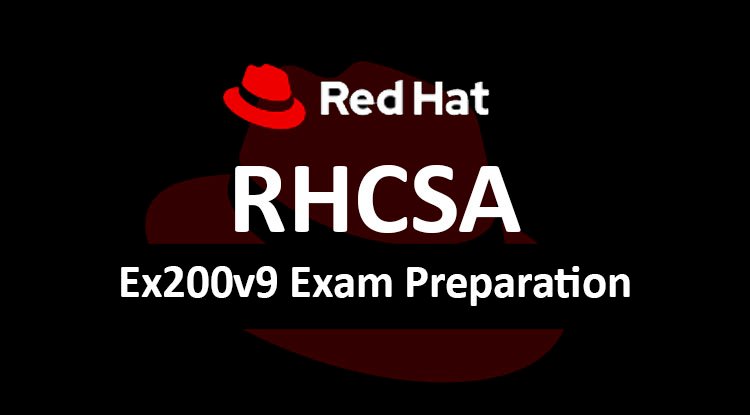RHCSA (Red Hat Certified System Administrator) - Overview


RHCSA (Red Hat Certified System Administrator) - Overview
RHCSA (Red Hat Certified System Administrator) is a certification offered by Red Hat to validate the skills and knowledge required to perform the core system administration tasks in a Red Hat Enterprise Linux (RHEL) environment. This certification is designed for IT professionals who work as system administrators in Linux-based systems, providing them with the necessary skills to deploy, configure, and manage Red Hat Enterprise Linux systems.
Key Details:
Certification Name:
Red Hat Certified System Administrator (RHCSA)Certification Code:
EX200Prerequisites:
There are no formal prerequisites to take the RHCSA exam. However, Red Hat recommends some prior experience or foundational knowledge in Linux administration, such as completing the Red Hat System Administration I (RH124) and Red Hat System Administration II (RH134) courses, or having equivalent experience.Exam Details:
Exam Format: Performance-based (hands-on tasks to be completed in a real-time environment).
Duration: 2.5 hours
Exam Code: EX200
Cost: Varies by region, typically around $400–$600 USD.
Delivery Method: The exam is usually taken in a proctored environment, either in-person or remotely.
Topics Covered: The RHCSA exam focuses on the following key skills and tasks:
Understanding and Using Essential Tools:
Accessing the command line
Managing files from the command line
Creating, viewing, and editing text files
Using tools like grep, sed, awk, etc.
Managing Filesystems and Storage:
Creating and mounting filesystems
Configuring swap space
Managing Logical Volume Manager (LVM)
Managing partitions, filesystems, and mounting options.
Deploying and Configuring Systems:
Installing Red Hat Enterprise Linux (RHEL)
Configuring network interfaces, hostname, and time zones
Managing users and groups
Setting up system services and managing them (start, stop, enable, disable)
Managing Security:
Implementing SELinux
Managing firewall rules (using firewalld)
Configuring sudo privileges
Securing the system with SSH
Package Management:
Installing, updating, and removing software packages using dnf and rpm
Configuring repositories and understanding package dependencies
Managing System Services:
Managing systemd services
Scheduling tasks with cron or at
Networking:
Configuring basic network settings (IP address, DNS, routing, etc.)
Configuring network interfaces and troubleshooting network issues
Monitoring and Troubleshooting:
Managing log files
Diagnosing system issues
Checking system performance and resource usage
Preparation:
Training Courses:
Red Hat offers official courses like RH124 (System Administration I) and RH134 (System Administration II) that cover all aspects needed for the RHCSA exam.
You can also attend instructor-led courses, online classes, or self-paced learning through Red Hat’s training platform.
Study Materials:
Red Hat provides official documentation and study materials that cover the exam objectives.
Practice labs and environments (available through Red Hat or other third-party providers) for hands-on practice.
There are many third-party RHCSA exam guides and books available that offer practice questions and hands-on labs.
Validity of the Certification:
The RHCSA certification is valid for 3 years. After that, you will need to renew it by either passing the current RHCSA exam or advancing to the next certification level (such as RHCE, Red Hat Certified Engineer).
Career Benefits:
Job Roles: System Administrator, Linux Administrator, IT Administrator, DevOps Engineer, Cloud Engineer, Infrastructure Specialist.
Salary Potential: RHCSA-certified professionals typically earn higher salaries compared to their non-certified counterparts due to their specialized skills in Linux system administration.
Industry Recognition: Red Hat is a leading enterprise provider for Linux systems, and the RHCSA is widely recognized in the IT industry as a benchmark for Linux administration expertise.
How to Register for the Exam:
You can register for the RHCSA exam on the official Red Hat website or through authorized training partners. You can take the exam at a test center or opt for remote proctoring if eligible.
RHCSA vs. RHCE:
RHCSA (System Administrator) is the entry-level certification focusing on essential system administration tasks in RHEL.
RHCE (Red Hat Certified Engineer) is the advanced certification that builds upon RHCSA and focuses on more complex tasks such as automation, performance tuning, and advanced network configurations.
Path to RHCE: After obtaining RHCSA, you can pursue the RHCE to enhance your skills and qualifications further.
Conclusion:
The RHCSA certification is ideal for professionals looking to prove their skills in Linux system administration. It is recognized globally and can significantly boost your career in IT infrastructure management, particularly in organizations using Red Hat Enterprise Linux.
